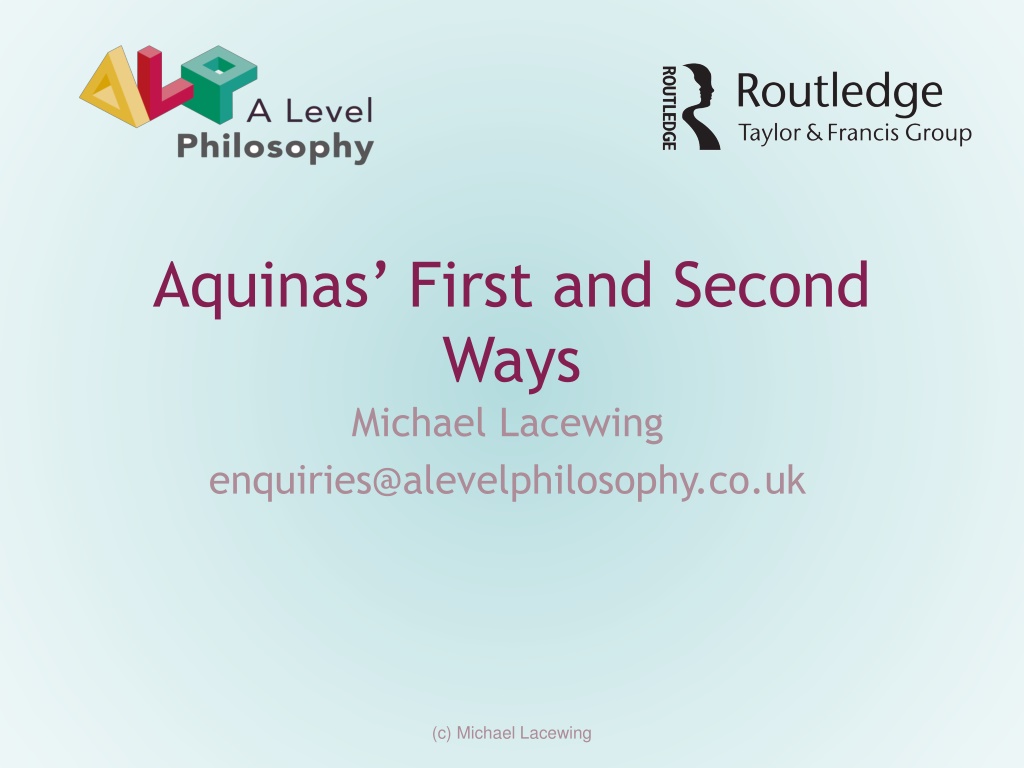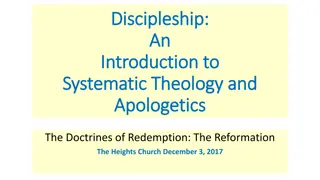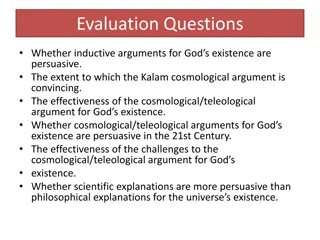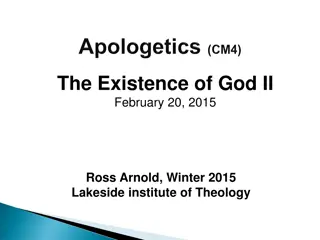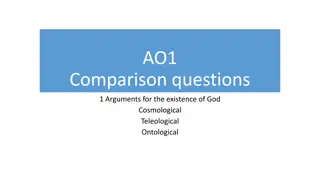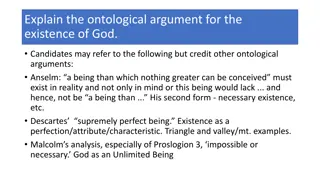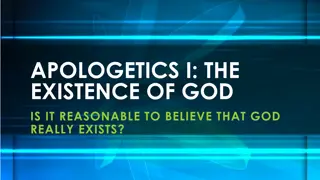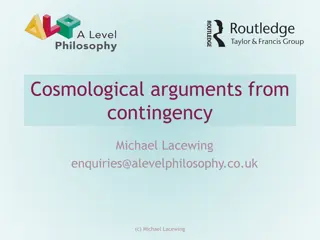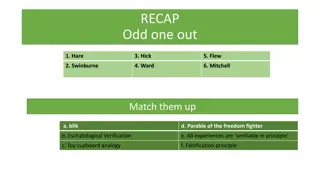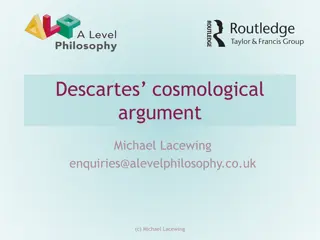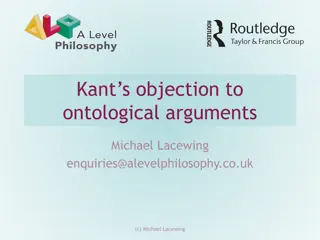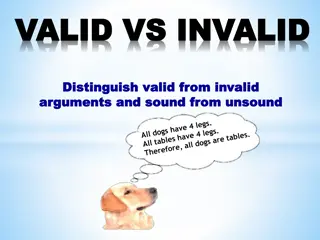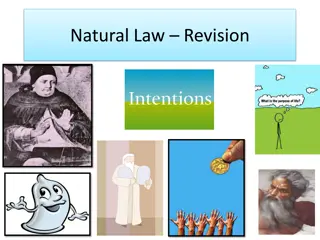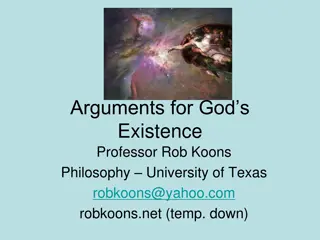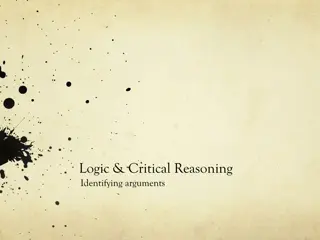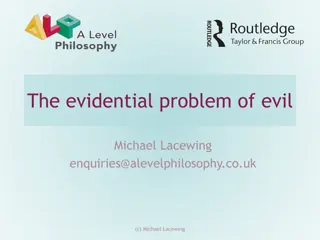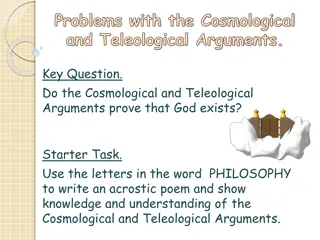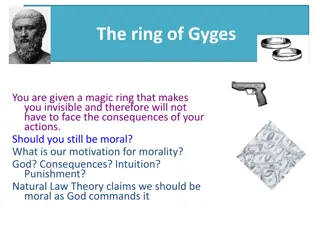Exploring Aquinas' Arguments for the Existence of God
Aquinas presents compelling arguments for the existence of God through the First and Second Ways, highlighting the necessity of a first cause and sustaining causes in the world. By delving into concepts of temporal and sustaining causes, Aquinas builds a philosophical framework that leads to the conclusion of God as the uncaused first cause. The intricacies of motion and existence are examined, emphasizing the self-sufficiency and ontological primacy of God in the context of causation.
Download Presentation

Please find below an Image/Link to download the presentation.
The content on the website is provided AS IS for your information and personal use only. It may not be sold, licensed, or shared on other websites without obtaining consent from the author. Download presentation by click this link. If you encounter any issues during the download, it is possible that the publisher has removed the file from their server.
E N D
Presentation Transcript
Aquinas First and Second Ways Michael Lacewing enquiries@alevelphilosophy.co.uk (c) Michael Lacewing
The question Why does anything exist? Unless God exists, this question is unanswerable. (c) Michael Lacewing
Temporal and sustaining causes Temporal cause: brings about its effect after it (the effect follows the cause in time) and the effect can continue after the cause ceases My parents me; Throwing the ball the ball flying Sustaining cause: brings about its effect continuously (rather than at a single point in time), and the effect depends on the continued existence and operation of the cause Sitting on a chair depends on gravity and the chair s rigidity Photosynthesis sunlight nuclear fusion (c) Michael Lacewing
Aquinas Second Way We find, in the world, (sustaining) causes and effects. Nothing can be the cause of itself. (To do so, it would have to have the power to sustain its own existence, but for that, it would already have to exist.) (Sustaining) causes follow in (logical) order: the first causally sustains the second, which causally sustains the third, etc. (Think of nuclear fusion sustaining sunlight sustaining plant growth.) If you remove a cause, you remove its effect. Therefore, if there is no first cause, i.e. a sustaining cause that does not causally depend on any other cause, there will be no other causes. (c) Michael Lacewing
Aquinas Second Way If there is an infinite regress of causes, there is no first cause. Therefore, given that there are (sustaining) causes, there cannot be an infinite regress of causes. Therefore, there must be a first cause, which is not itself caused. God is the first cause. Therefore, God exists. (c) Michael Lacewing
Why God? The first cause not as a first cause in time, but ontologically first not sustained by anything else Is the first cause God? Reply: what else could it be? Natural things are causally dependent, not self- sufficient, in their existence Our concept of God includes the idea that God is self-sufficient (c) Michael Lacewing
Aquinas on motion Motion : not motion through space, but how properties change from potential to actual Change involves something that was potential becoming actual E.g. a pan of cold water becoming hot what is cold is potentially hot, what is hot is actually hot Change can only be brought about by what is actual E.g. an actual (not merely potential) heat source must be applied to the pan (the hob must first be turned on) Mover : something that brings about a change from potential to actual A mover must first be actual to bring about a change (c) Michael Lacewing
Aquinas First Way Some things in the world undergo change. Whatever changes is changed by something, i.e. change is caused. The cause must be something else. Something potential can only be made actual by something that is already actual. A property can t cause itself to exist. If A is changed by B, and B is changed, then B must have been changed by something else again. If this goes on to infinity, then there is no first cause of change. (c) Michael Lacewing
Aquinas First Way To remove a cause is to remove its effect. Therefore, if there is no first cause of change, then there are no other causes of change, and so nothing changes. Therefore, there must be a first cause of change, i.e. something that causes change but is not itself changed. The first cause of change is God. Therefore, God exists. (c) Michael Lacewing
Discussion First cause of change : something that is actual and not potential, an unmoved mover Causing change : can be understood in terms of temporal causes, but Aquinas is more interested in dependencies than changes in time The key point is that to explain changes from potential to actual, we must find something that is entirely actual and never potential ontologically first (c) Michael Lacewing
Objection: The causal principle Is it true that everything has a cause? Hume: It is not analytic, so it is not certain. Experience supports it, but can t show that it holds universally Could the existence of things be uncaused? E.g. could fundamental physical processes not be sustained by anything else, but be brute facts? Or could sustaining causes be replaced by highly complex and rapid temporal causes? Does Hume s objection only show that Aquinas hasn t provenGod s existence, yet we still have good reason to think Aquinas is right? (c) Michael Lacewing
An infinite series of causes Aquinas: there cannot be an infinite series of causes That s fine. We know this universe began just under 14 billion years ago This reply assumes Aquinas is talking about temporal causes, not sustaining causes The universe isn t self-sustaining That the universe had a beginning shows that it was not always actual. Something actual had to cause the Big Bang. Perhaps another universe an infinite series of universes (c) Michael Lacewing
Actual infinities Infinity is not a very large number An infinite regress of causes never has a starting point The concept of infinity makes sense. But does an actual infinity? A hotel with an infinite number of rooms, when full, can take more people (an infinite number more)! This is nonsense a hotel can t be full and have room (c) Michael Lacewing
Actual infinities If there is an infinite chain of universes, each new universe does not add to the number of universes If there is an infinite series of causes, we could never have reached the point in the series we are at now An actual infinity creates paradoxes so we should reject the claim that actual infinities exist (c) Michael Lacewing
Objection: infinity again Hume: It is not an analytic truth that an infinite regress is impossible. So we must allow that it is possible. Does this make sense? Hume needs to solve the paradoxes regarding an actual infinity. (c) Michael Lacewing
Infinity again Objection: The problem is with our thought We need new ways of talking about infinities Aquinas wrongly think of an infinite chain of causes as like a finite chain, but with the first cause removed But an infinite chain of causes is simply a chain in which every cause is itself caused But then we cannot explain the whole chain (how it comes to exist at all) (c) Michael Lacewing
